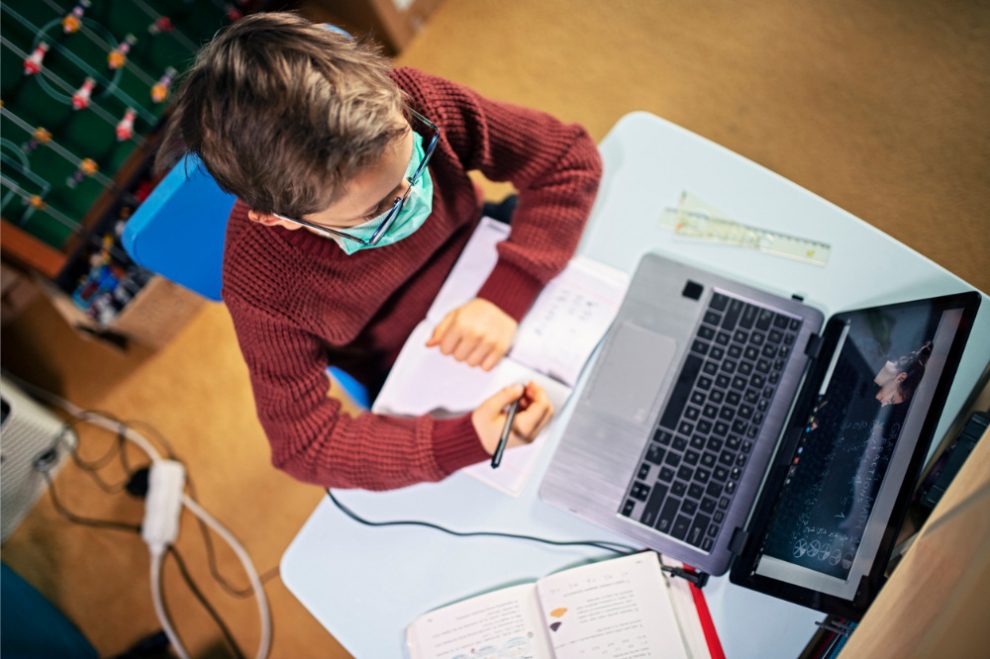American author, Neil Postman, once stated, “I am not a Luddite. I am suspicious of technology. I am perfectly aware of its benefits, but I also try to pay attention to some of the negative effects.” There is no doubt that technology has vastly improved the world in many ways. It is a vital part of life and some would even deem it a necessity. Since the COVID-19 outbreak, technology has become more useful than ever. In order to slow the spread of the virus, remote learning has taken over academics. Students do the majority of their work online, and use “Zoom”, a video communications device, to interact with their teachers and classmates many days of the week. While this process may seem highly beneficial, the consequences of this increased screen time can not be overlooked. Students and teachers have had a significant increase in screen time, and although it may not seem like it, it has been taking a toll on their health already. If a change is not made, this increased technology usage will lead to negative mental and physical health effects going forward.
Increase in screen time, due to remote learning, has negatively affected the social, emotional, and mental healths of students and teachers. A blogger named Edward Roesch noticed that many students miss the social aspects of the learning experience. His study states, “55% of students still find the lack of social interactions troubling. They learn better with fellow students, and for 45% of students, this could lead to underperforming in their academics.” He also explains how remote learning can cause nerves and anxiety, resulting in academic underperformance. Roesch also states that students with lower grades generally are more likely to struggle with distance learning. In addition to this, members of the University of Colorado Boulder polled many of their own students on this topic. They asked students about how remote learning has been affecting them, and the results are quite alarming. When they sent out their poll, 94% of students said that remote learning has negatively affected them, 71.7% stated that they are doing worse in school, 64.7% said they were more stressed at home, 98.5% responded that they have a lack of motivation to complete their homework and 85.5% of students find school harder as a result of online learning. Based on this evidence, it is safe to say that remote learning has been vastly hindering the quality of education that students have been getting. People have become less academically motivated and find it harder to focus via online schooling. They are more stressed and feel as though they need to work harder than ever to do well.In the Blind Brook community, James Gallagher, a sophomore, even stated, “I find it harder to do well in remote learning. I sit behind a screen for seven hours a day only to have more work to do after school. I am just unmotivated in general and hope we can return to school full time soon.” James is not alone. Many people in Blind Brook feel as though online school has been hindering their motivation levels and has lead to underperformance in general. It is obvious from all of these different sources that socially, emotionally, and mentally, students have been negatively affected by online learning.
It is reasonable to say that mental health might be the aspect that has been negatively impacted the most. This is proven in early data from the National Institutes of Health (NIH) study that began in 2018, which indicated that children who spent more than two hours a day on screen-time activities scored lower on language and thinking tests. In addition, some children with more than seven hours a day of screen time experienced thinning of the brain’s cortex, the area of the brain related to critical thinking and reasoning. Due to remote learning, students spend at least 7 hours on screens a day, if not more. Clearly, if student’s brains are functioning at a lower level, and their cortexes may experience thinning, something needs to change! In addition to this, screens emit blue light. According to Harvard Medical School, blue light “can disrupt sleep patterns by suppressing the secretion of the hormone melatonin.” Melatonin is vital for sleep, and if students are overtired, their health will inevitably deteriorate. Karen Katzman, an occupational therapist, added that she works with a lot of children who unfortunately spend a lot of their time on a screen. When asked how it affected them, she responded in one simple word, “poorly.” She then elaborated by saying how “increased blue light intake and screen time leads to hyperactivity and a decreased attention span.” She then added that these issues could be prevented if “children spend less time on devices.” Through this evidence and scientific research, it is clear that screen time must be minimized in order to prevent future health problems. If not properly handled, remote learning will continue to harm students across the globe.
Although this will be difficult, in the distance learning system, excessive screen time must be reduced. Students and teachers are experiencing many negative effects as a result of sitting behind a screen all day during online school and will continue to do so as long as nothing changes. All aspects of one’s health are in danger, and student’s brains will continue to deteriorate if this screen time is maintained. Based upon an abundance of scientific research and discussion, it is evident that something must be done to limit the amount of screen time experienced by students.







